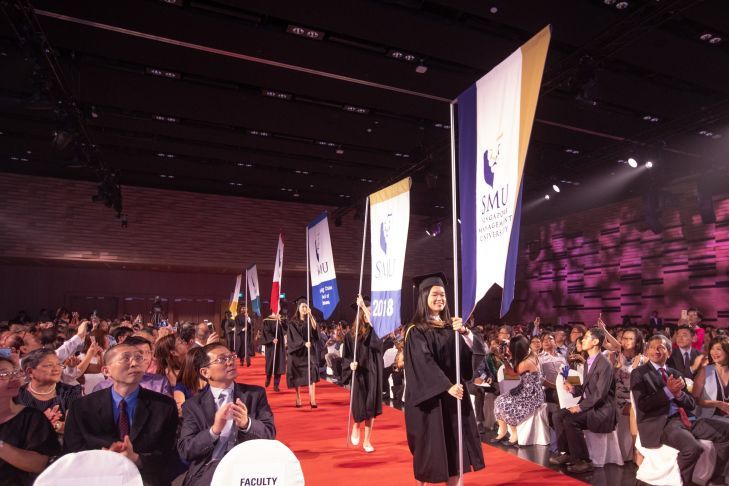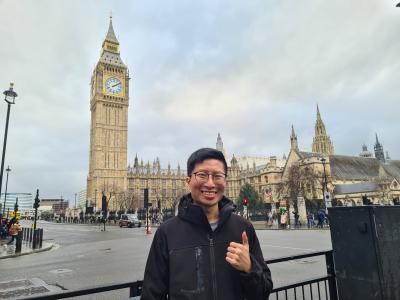
Singapore, 26 February 2019 (Tuesday) – Graduates from Singapore Management University’s (SMU) 15th cohort have registered a healthy and stable overall employment rate1 of 91.8% and good starting salaries across all six of the university’s degree programmes.
The results were revealed in an annual Joint Autonomous Universities Graduate Employment Survey (JAUGES) conducted by SMU and the other Autonomous Universities.
79.7% or 1,503 of the 1,886 SMU alumni who graduated in 2018 took part in the survey.
The survey showed that 91.8% of SMU graduates in the labour force gained employment within six months of completing their final examinations. 66.6% were offered jobs before graduation, a slight increase as compared to the 2017 cohort. Of those who received job offers, 50% were offered full-time employment through internships, which are compulsory for SMU undergraduates. 26.2% accepted the offers from their internship employers.
Both the mean and median gross monthly salaries are at an all-time high. The mean gross monthly salary of SMU graduates in full-time permanent jobs is $3,977 in 2018, a modest increase over the previous year’s salary of $3,910. The median gross monthly salary of graduates in full-time permanent employment is $3,600 in 2018, up from $3,500 in 2017.
Similar to the previous year, the top three industries of employment for SMU graduates were “Financial and Insurance”, “Information & Communication”, and “Legal, Accounting and Auditing”, with “Financial and Insurance” maintaining its position as the highest paid industry with an average gross monthly salary of $4,767.
SMU President, Professor Lily Kong said, “We are heartened by SMU’s strong track record in preparing graduates well for various industries and with high market value. Apart from a rigorous academic curriculum, SMU students develop various skills through global exposure, community service, campus life and internships, giving them the opportunity to become well-rounded individuals and leaders who can in turn make meaningful impact in Singapore and beyond.”
“95% of 2018 graduates felt that SMU’s curriculum made a positive impact on them while 98% said they had experienced growth during their time with us. 98% of students indicated that SMU has prepared them well in the areas of oral communications and presentation skills, while 96% said they learnt how to learn independently, as well as develop in the areas of interpersonal effectiveness which makes them better at teamwork and networking. These critical skills are necessary and very much valued in any workplace today,” added Prof Kong.
Career Services offered by Dato’ Kho Hui Meng Career Centre (DKHMCC)
The Centre offers a range of comprehensive services, programmes, and resources for SMU students to chart their career directions and empower them with the necessary skills to realise their potential and goals. 87% of the 2018 graduates said that they had benefited from SMU’s career services.
Each student is assigned a career coach upon matriculation to support them in their career planning through the four-year journey at SMU. These certified coaches from DKHMCC come from diverse backgrounds and are in tune with industry developments and trends. They administer personality/career profiling tools, critique cover letters and resumes, facilitate job searches, and hone students’ interview skills.
In addition, DKHMCC also offers career services workshops from the freshman year as part of SMU’s pioneering Finishing Touch (FT) programme. The compulsory programme prepares SMU undergraduates in career management skills and gears them towards employability and career readiness by helping students develop and focus on their career goals progressively throughout their four-year course of study. Every year, DKHMCC organises more than 200 events such as career and industry talks, employability clinics, career fairs, as well as networking events, for our graduating students.
Recognising the importance and value of having real-world and career-relevant work experience for its students, SMU is the first university in Singapore to make internships compulsory for all students across the entire university. Students are provided opportunities via DKHMCC, which works closely with industry to ensure successful placement of students in internships and jobs. The DKHMCC’s close and regular contact with employers is vital in helping SMU students be market-relevant and career-ready. Students also have access to a 24/7 web based portal (OnTRAC) to search for internships and career opportunities.
DKHMCC also continues to support graduates up to one year after their graduation with continued access to the jobs portal, employability clinics, and personalised assistance by individual career coaches, should they require further guidance.
Examples of 2018 Graduates who have benefited from the SMU educational experience
Tay Jing Ying, a graduate from the School of Information Systems, has had two internship experiences to explore different industries and gain global exposure. The first one was an overseas internship in Pune, India, where she worked in Extentia Information Technology, a software development consulting firm. The internship gave her the opportunity to work with clients, understand their needs and develop the software in an agile team. Her second internship was with Bank of America Merrill Lynch, where she is currently employed as a Technology Analyst. This internship allowed her to gain knowledge about the operations of investment banks as well as technology in the financial industry. Her technical capabilities were recognised and she managed to convert from an intern to a full-time permanent employee. She said, “I believe this is highly attributed to my experience in SMU which has provided me with many enriching opportunities, including overseas community service projects and overseas exchange, and developed my global mindset. Apart from the technical knowledge gained at SMU, the curriculum has also built my analytical thinking, resilience and interpersonal skills which are crucial and relevant in the real world.”
Friedemann Ang, also from the School of Information Systems, is working as a data scientist at Datavlt, a Singaporean tech startup. He completed five internships with the aim of getting a feel of what it was like to work in startups, government, and corporate sectors and also to better understand the differences between working in tech and non-tech companies. He said, "As a fresh graduate, my top priorities are to get as many responsibilities as I can in my first role and also to have excellent access to very talented peers and managers. SMU gave me the opportunity to develop technical skill sets and build the contacts necessary to kick-start my career. Since I had an experience that most closely met my career goals while interning at a tech startup, I decided to head in that direction."
Tanushree Rohera, a graduate of the Lee Kong Chian School of Business, undertook three internships as she wanted to gain exposure to different industries. In her final internship, she developed a strong interest in data analytics and this was crucial in getting a role as a technical consultant at Tableau. According to her, “SMU helped me develop the focus and drive to grow the skills and network required for my career. Through the diversity of courses, leadership positions, internship experiences, real-world group projects and networking events, I gained exposure to completely diverse disciplines and industries, in working with people and in developing my own sense of confidence. All of this has been critical in helping me as I take up new projects at work.”
SMU’s 2018 graduates across all six Schools enjoyed competitive monthly salaries
Information Systems graduates earned the highest salary with a mean monthly salary of $4,160, a 3.6 per cent increase over the 2017 cohort ($4,014). The median gross monthly salary is $4,000, same as that in 2017. Those with Cum Laude or better earned a mean gross monthly salary of $4,659, compared to 2017’s $4,305 and a median gross salary of $4,685.
Economics graduates earned a mean monthly salary of $4,140, similar to that in 2017 ($4,143). The median gross monthly salary was $3,700, same as in 2017. Those with Cum Laude or better earned a mean gross monthly salary of $4,721, close to last year’s $4,737 while the median gross monthly salary was $4,000.
Business Management graduates' mean gross monthly salary of $4,133 increased by 3.5 per cent from last year’s $3,995. The median gross monthly salary also increased to $3,700, up from $3,500 in 2017. Those with Cum Laude or better earned a higher mean gross monthly salary of $4,544, up from last year’s $4,504 while the median gross monthly salary was $4,000.
Accountancy graduates earned a mean monthly salary of $3,607 as compared to $3,646 in 2017. The median gross monthly salary remains at $3,000. Those with Cum Laude or better earned a mean gross monthly salary of $4,439, up from last year’s $4,089 while the median gross monthly salary was $3,550.
Social Sciences graduates earned a mean monthly salary of $3,409 as compared to $3,493 in 2017. The median gross monthly salary is $3,210 as compared to $3,300 last year. Those with Cum Laude or better earned a mean gross monthly salary of $3,880 (last year’s was $3,938) while the median gross monthly salary was $3,600.
Please refer to Annex for the detailed figures.
The follow-up survey2 on SMU Law graduates showed that 92.7% per cent of the respondents who were in the labour force were employed. The mean and median gross monthly salaries of Law graduates in full-time permanent employment were $4,856 and $4,500 respectively. Those who attained a Cum Laude and above had a mean gross monthly salary of $5,256 and median gross salary of $5,513.
[1] The overall employment rate refers to the number of graduates working on a full-time permanent, part-time, temporary or freelance basis, as a proportion of graduates in the labour force (i.e. those who are working, and those who are not working but are actively looking and available for work) as at 1 November 2018.
[2] SMU’s Law graduates in 2017 were excluded from the 2017 survey as they were undergoing pupilage in the first six months of their graduation. They have since started employment and have been included in the follow-up survey of GES 2018.


